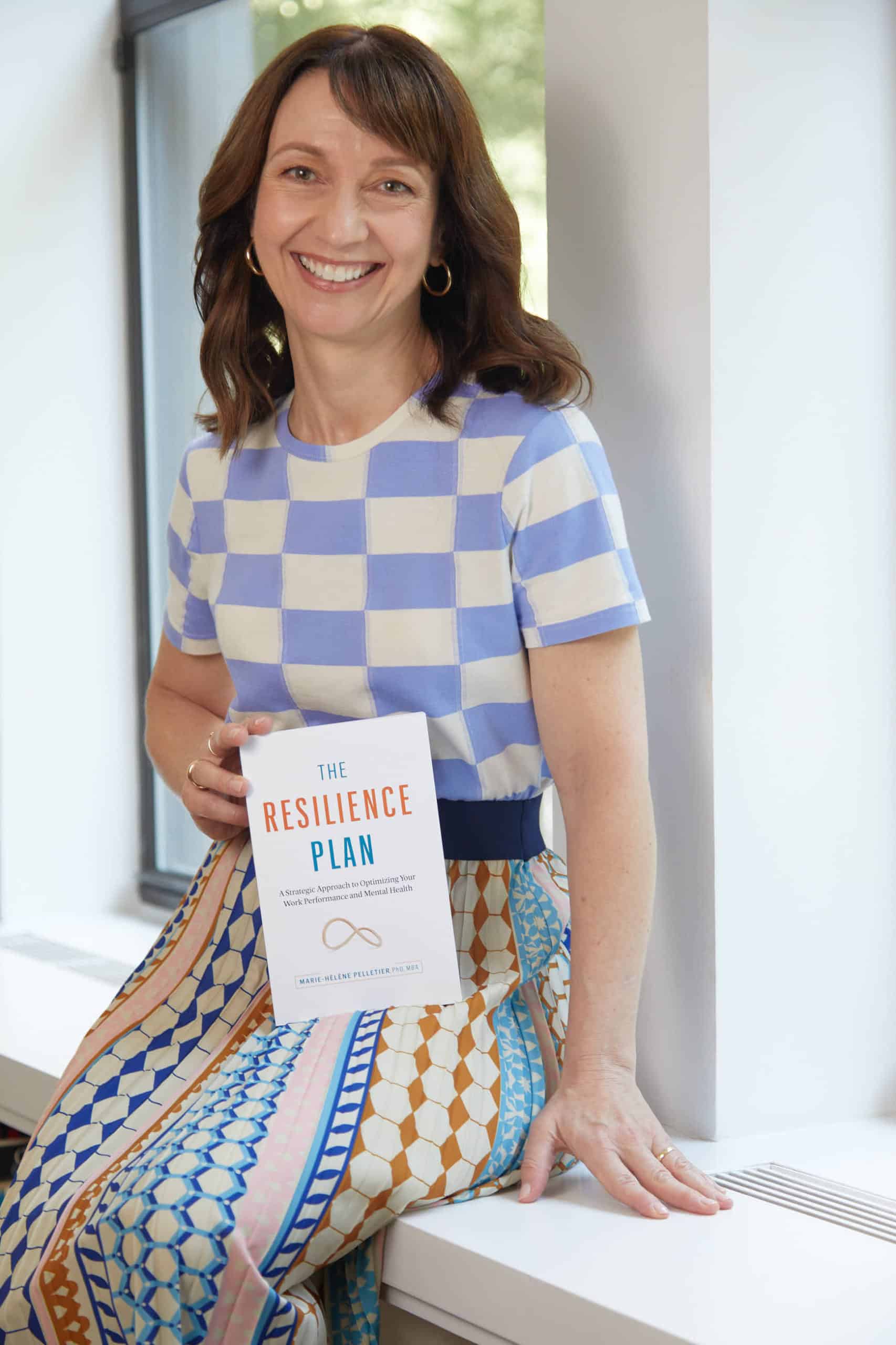
Executive Health and Life
How to Improve Your Work Performance and Resilience
In today’s fast-paced, high-pressure work environments, keeping up with the demands of your job can feel like a marathon. But what if there was a way to not just keep up but excel—without burning out? The key lies in building and maintaining resilience, a skill often overlooked but crucial for long-term success and well-being.
In a recent Executive Health and Life episode, I had the privilege of sitting down with Dr. Marie-Helene Pelletier, a workplace mental health expert and leadership psychologist, to discuss how resilience can be a game-changer in improving work performance. Dr. Pelletier, author of “Th” Resilience Plan,” s” ared valuable insights and practical strategies that anyone can use to enhance their resilience and, consequently, their work performance. Here’s what I learned.
Understanding Resilience: More Than Just Bouncing Back
Resilience is often misunderstood as merely the ability to bounce back from setbacks. While that’s part of it, resilience is much deeper and more powerful. According to Dr. Pelletier, resilience is overcoming adversity and coming out even stronger on the other side. It’s not just about surviving challenges; it’s about thriving despite them.
But here’s the twist—resilience isn’t a personality trait. It’s a skill that can be developed, nurtured, and strategically implemented in your life and career. This is what Dr. Pelletier refers to as strategic resilience.
The Importance of Strategic Resilience
Think about strategic resilience as you would a business plan. When launching a new product or service, you don’t just dive in without a plan. You analyze the market, identify potential risks, and develop a strategy to maximize success. The same approach applies to resilience.
Strategic resilience involves understanding your personal and professional context, identifying potential stressors, and developing a tailored plan to strengthen your ability to handle challenges. It’s about being proactive rather than reactive.
Recognizing the Early Signs of Declining Resilience
One of the most critical aspects of resilience is awareness—specifically, being aware of the early signs that your resilience might be waning. Dr. Pelletier highlighted several indicators that high performers often overlook:
-
Overextension: You take on more than you can handle, even if you don’t feel exhausted.
-
Decreased Engagement: You’re not feeling as motivated or excited about your work as you used to.
-
Impatience: You find yourself becoming more irritable or short-tempered.
-
Concentration Issues: Tasks that once required little effort now take much longer and multiple attempts to complete.
Recognizing these signs early allows you to take action before they snowball into more significant issues like burnout or mental health challenges.
Building Resilience: Practical Exercises to Get Started
Dr. Pelletier shared some practical exercises that you can implement right away to start building your resilience:
-
Values Alignment: Start by identifying your core values. What’s most important to you in life? Aligning your actions and decisions with your values is crucial for maintaining motivation and purpose, which are foundational to resilience.
-
Supply and Demand Table: Create a simple table with two columns—demands on the left and sources of supply on the right. List all the demands on your time and energy (positive and negative), then list the things that replenish your energy. This exercise helps you identify areas where you might be overextending yourself and where you need to bolster your sources of supply.
-
Meditation: Incorporating meditation into your daily routine can be transformative. It helps manage stress, improves focus, and enhances overall mental well-being. Even if you’re skeptical or think meditation isn’t for you, Dr. Pelletier insists it’s worth trying—after all, we all have a brain that benefits from a little quiet time.
The Power of Collective Resilience
While personal resilience is vital, it’s equally important to think about it collectively, especially if you’re in a leadership position. Collective resilience refers to the strength of your team or organization. How well does your team bounce back from challenges? How do they handle high-pressure periods?
Building collective resilience involves open communication, proactive planning for high-demand periods, and fostering a culture that values mental health and well-being. When a team is collectively resilient, they’re better equipped to handle challenges without succumbing to stress or burnout.
Resilience as a Competitive Advantage
In today’s competitive landscape, resilience isn’t just a nice to have; it’s a strategic advantage. Organizations that prioritize resilience—both individual and collective—are better positioned to navigate challenges, adapt to changes, and maintain a focus on both internal operations and external opportunities. As Dr. Pelletier pointed out, resilient organizations can keep an eye on the big picture while managing internal demands, reducing the risk of being blindsided by external factors.
Success Redefined: Aligning with Your Values
Finally, Dr. Pelletier emphasized the importance of redefining success to align with your values. Success isn’t just about reaching the next milestone or achieving external validation—it’s about feeling fulfilled and satisfied with the direction your life and career are taking. When you’re clear on your values and your actions align with them, you’ll likely experience true, sustainable success.
Take Action: Start Building Your Strategic Resilience Today
Improving your work performance isn’t just about working harder or more intelligent; it’s about building the resilience needed to sustain high performance over the long haul. Start by incorporating the exercises shared by Dr. Pelletier into your routine, and remember that resilience is a skill you can develop and strengthen over time.
Whether you’re a leader looking to enhance your team’s resilience or an individual contributor aiming to boost your resilience, the strategies discussed in this episode are a great starting point. Take the time to invest in your resilience—it’s a game-changer that will improve your work performance and overall quality of life.
Key Takeaways:
Introduction to Resilience: Understand what resilience really means and why it’s essential for professional success.
Strategic Resilience: Learn how to develop a tailored, strategic approach to building resilience that fits your unique context.
Mental Health Post-Pandemic: Explore the shifts in mental health awareness and the ongoing challenges professionals face in maintaining psychological well-being.
Recognizing Early Signs: Identify the early indicators of declining resilience and how to address them before they become major issues.
Collective Resilience: Discover how teams and organizations can build collective resilience to enhance overall performance and sustainability.
Practical Exercises: Get actionable exercises and strategies to start improving your resilience today.
— Episode Chapter Big Ideas (timing may not be exact)
00:00 – Introduction to the Episode
00:40 – Meet Dr. Marie-Helene Pelletier: Workplace Mental Health Expert
02:04 – The Importance of Resilience in High-Performance Roles
03:30 – Dr. Pelletier’s Journey: From Teenager to Leadership Psychologist
04:16 – Post-Pandemic Mental Health: Changes and Challenges
06:00 – Why Resilience and Strategic Thinking Go Hand in Hand
07:01 – Mental Health in the Business World vs. Clinical World
08:21 – Recognizing Early Signs of Declining Resilience
10:14 – Balancing Confidence and Self-Awareness in High Performers
12:27 – The Growing Self-Awareness Movement: Why It’s Happening
13:35 – The Impact of AI on Workplace Mental Health and Resilience
17:03 – Defining Resilience and Strategic Resilience
20:04 – Steps to Grow Your Resilience: A Strategic Approach
22:54 – Challenges Leaders Face Today That Test Their Resilience
24:24 – Myths About Resilience: What High Performers Get Wrong
26:05 – Future vs. Past Orientation in High Performers
28:13 – Practical Exercises to Start Building Resilience Today
32:58 – Walking the Fine Line Between Productivity and Burnout
35:08 – Collective Resilience: Building a Resilient Team
37:04 – What Does a Resilient Organization Look Like?
39:08 – Getting Leadership Buy-In on Psychological Resilience
41:03 – Dr. Pelletier’s Personal Resilience Strategies
42:05 – The Rewarding Experience of Writing a Book
44:46 – Redefining Success: Aligning Values with Life Goals
47:12 – Final Advice: Be Strategically Resilient

